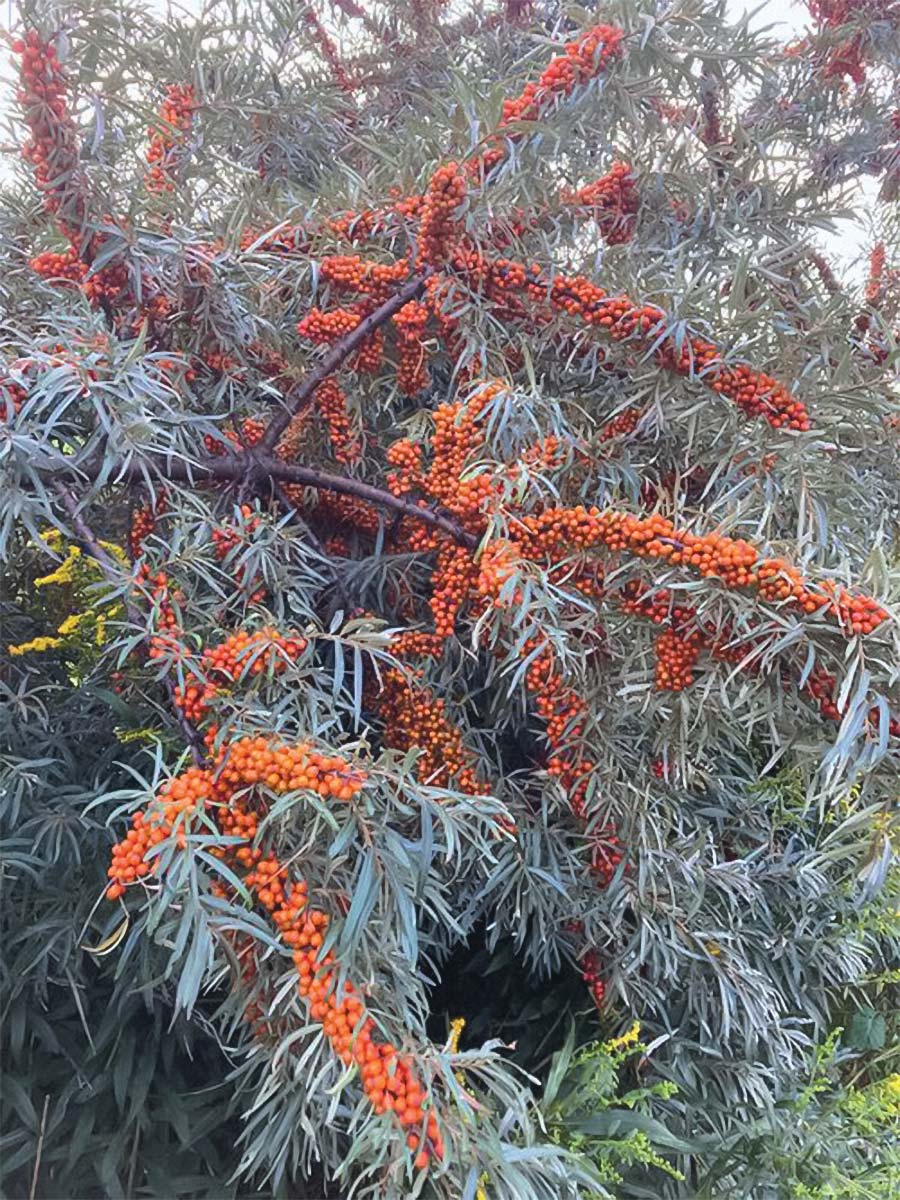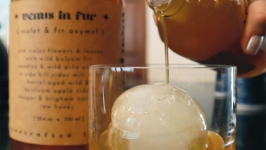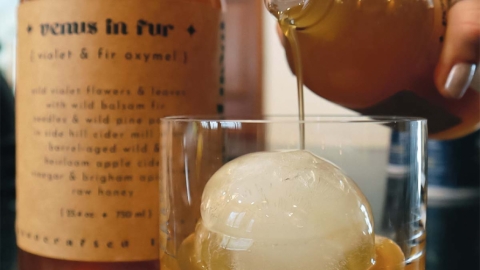Wolfpeach
Wolfpeach is a Vermont-based company restructuring tonic medicinal herbalism. Their inviting, inclusive line of elixirs makes a sleek base for nonalcoholic drinks and pairs seamlessly with spirits, bridging the gap between the wellness sphere and Vermont’s social scene, all while putting a new spin on cocktail menus.
Devised before the invention of alcohol distillation, the oxymel is the ancient version of the tincture. Instead of using alcohol to extract and preserve a plant’s flavor and medicinal value, Wolfpeach elixirs employ vinegar and honey, which make the oxymel a more affordable cousin to the tincture and offer a more versatile application in the world of food and drink. The result is similar to a shrub, but a lower water content means higher potency and longer shelf life. With flavors that range from rose to balsam fir, and benefits that range from supporting the cardiovascular system to bolstering the nervous system, Wolfpeach has something for everyone.
A champion of local farms, Wolfpeach boasts their ingredient list on the front of their product's labels, including the sources for everything.
In addition to liquid libations, one of the company’s most sought-after products is herbal salts. Mermaid Dust is a blend of rose petals, wild Atlantic dulse, calendula, and Celtic sea salt; its fuchsia hue makes for a show-stopping salt rim, and “when combined with water and the vinegar and honey present in the oxymels,” the company’s founder, Fiona Lucia Genadio-Allen, explains, “you get a full-spectrum electrolyte drink that elevates hydration and helps to prevent a hangover. It doubles as being great for a post-workout, too.”
A champion of local farms, Wolfpeach boasts their ingredient list on the front of their product's labels, including the sources for everything. “In a system drowning in preservative-rich, nutrient-void ‘food,’” Fiona, a London-trained chef and Vermont-trained herbalist, believes in transparency, giving credit where credit is due, and promoting other small businesses that are operating with integrity to revolutionize the culinary climate. Their products are good because the farmers are noble; they use agricultural techniques that support optimal soil health while producing ingredients that contain exemplary levels of potency.
The line of vibrant, medicinal innovations is taking the drink scene by storm and provides a novel approach to cocktails: mixers with nuanced flavor and ingredients. Fiona says she can’t emphasize enough the power of the menu: “By introducing people to new and old ideas, it inspires them to seek out different ingredients at the grocery store, to try out new techniques at home. We’re grateful for our place on the menu and the platform it provides; our mission is to popularize tonic herbalism. We want to promote robust resiliency and the empowerment that comes with incorporating these ancient elixirs into daily life.”
Fiona doesn’t want Wolfpeach or other nonalcoholic drinks labeled as “mocktails,” though. “I’m obsessed with etymology. Words come with deep, nuanced history and wield underestimated power: language matters, and I take real issue with the word mocktail. There’s something undignified about it. Faux fur, monopoly money, Elvis impersonators, ‘mock’ alludes to something that masquerades, void of quality and authenticity, trying to emulate something genuine. That’s not what we’re doing here. We’re not making knockoffs, this isn’t the kids’ menu, and it shouldn’t feel like a concession to order a zero-proof cocktail.
The drinks we’re talking about are sophisticated, inventive; they’re on the cutting edge and the language surrounding them needs to adequately convey that.”
Fiona loves seeing the expansion of the zero-proof offerings. “Having a single nonalcoholic option at the bottom of a drink list robs the sober consumer, or the consumer who simply isn’t in the mood for booze, of the thought-provoking experience of curiously perusing a menu. The diversification of zero-proof options is the way forward. Vigorous health and being the life of the party don’t have to be mutually exclusive. Normalize inclusivity, normalize drinking at a slower pace, normalize pairing booze with health; and normalize doing all that with panache.”
Experts say it’s optimal to consume 30-plus different plants per week.

Seaberry from Perfect Circle Farm, a Wolfpeach partner. Photo courtesy Perfect Circle Farm
Robust Resiliency
From the raw, barrel-aged apple cider vinegar they use, to the locally grown sea buckthorn berries, Wolfpeach’s elixirs pride themselves on having an abundance of vitamins and minerals and a vast array of biodiversity. Bacterial diversity of the gut correlates directly to the variety of plants you consume, and diversity here means more robust resiliency in the immune system. Experts say it’s optimal to consume 30-plus different plants per week. “By no means am I suggesting cooking a dozen different vegetables for dinner,” Fiona says. “Instead, drink a cocktail about it.” Mixing a drink with one of Wolfpeach’s oxymels, a dash of Notorious digestive bitters, and a salted rim featuring their salt can mean 11 different plants in your glass.







